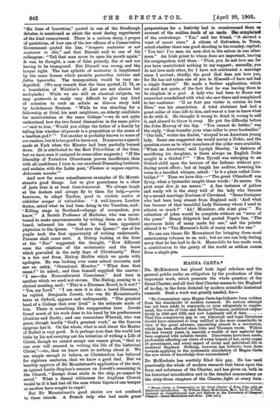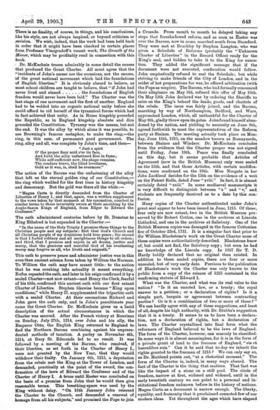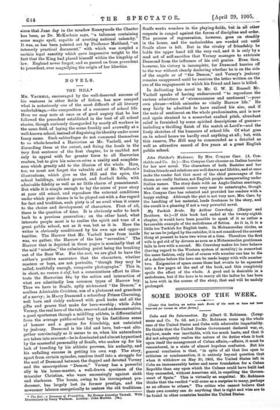MAGNA CARTA.*
DR. MCKECIINIE has placed both legal scholars and the general public under an obligation by the production of this important work, which presents the whole question of the Great Charter, and all that that Charter means to the England of to-day, in the form dictated by modern scientific historical research. Such a work was greatly needed, for— "No Commentary upon Magna Carta has hitherto been written from the standpoint of modern research. No serious attempt has yet been made to supersede, or even adequately to supple- ment, the works of Coke and Richard Thomson, published respec-' tively in 1642 and 1829, and now hopelessly out of date That this conspicuous gap in our historical and legal literature. should have remained so long unfilled is the more remarkable in
view of the great advance, amounting almost to a revolution, which has been effected since Coke and Thomson wrote. Within the last twenty years, in especial, a wealth of new material has been explored with notable results. Discoveries have been made, profoundly affecting our views of every branch of law, every organ of government, and every aspect of social and individual life in medieval England. Nothing, however, has hitherto been done, towards applying to the systematic elucidation of Magna Carta' the new stores of knowledge thus accumulated."
Dr. McKechnie has worthily filled this gap. He has used practically the whole of modern research that bears upon the. form and substance of the Charter, and has given us, both in, his historical introduction and in the detailed commentary on the sixty-three chapters of the Charter, light at every turn
Magna Carta: a Commentary on the Great Charter of King John, with an Historical Introduction. By William Sharp McKechnie, M.A., LL.B., D.PhiL, Lecturer on Constitutional Law and History in the University of Glasgow., Glasgow : James MacLehose and Sons. [14s. net.]
like his style, are not always inspired, or beyond criticism or revision. We wish, indeed, that the work had been held back in order that it might have been checked in certain places from Professor Vinogradoff's recent work, The Growth of the Manor, which may be profitably read in connection with this book.
. Dr. McKechnie traces admirably in some detail the causes that produced the Great Charter. All must agree that the "incidents of John's career are the occasions, not the causes, of the great national movement which laid the foundations of English liberties." It is obviously absurd to believe, as most school children are taught to believe, that "if John had never lived and sinned the foundations of English freedom would never have been laid." The Charter was the last stage of one movement and the first of another. England had to be welded into an organic national unity before she could afford to rid herself of the tyrannical forces which had in fact achieved that unity. As in Rome kingship preceded the Republic, so in England kingship absolute and dire preceded the Constitution. Tyranny was the means, but not the end. It was the alloy by which alone it was possible, to use Browning's famous metaphor, to make the ring,—the ring, in this case, of permanent good government. The ring, alloy and all, was complete by John's time, and then-
" Just a spirt 0' the proper fiery acid o'er its face, And forth the alloy unfastened flies in. fume; While self-sufficient now, the shape remains, The rondure brave, the lilied loveliness, Gold as it was, is, shall be evermore."
The action of the Barons was the unfastening of the alloy that left us the eternal golden ring of our Constitution,— the ring which wedded for the first time in history kingship and democracy. But the gold was there all the while :— " Magna Carta is directly descended from the Charter of Liberties of Henry I., and that, again, was a written supplement to the vows taken by that monarch at his coronation, couched in similar terms to those invariably sworn at their anointing by the Anglo-Saxon Kings of England, from Edgar to Edward the Confessor."
The oath administered centuries before by St. Dunstan to King Ethelred is but expanded in the Charter :—
"In the name of the Holy Trinity I promise three things to the Christian people and my subjects : first that God's Church and all Christian people of my dominions hold true peace ; the second is that I forbid robbery and all unrighteous things to all orders ; and third, that I promise and enjoin in all dooms, justice and mercy, that the gracious and merciful God of his everlasting mercy may forgive us all, who liveth and reigneth."
This oath to preserve peace and administer justice was in this even then ancient solemn form taken by William the Norman. To William the oath may have meant little : to the nation that he was crushing into actuality it meant everything. Rufus repeated the oath, and later in his reign confirmed it by a sealed Charter—not now extant—and Henry the Clerk, fearful of his title, confirmed this ancient oath with our first extant Charter of Liberties. Stephen likewise became "King upon conditions," while Henry II. supplemented the tripartite oath with a sealed Charter. At their coronations Richard and John gave the oath only, and in John's penultimate year came the Great Charter. Dr. McKechnie gives us a lucid description of the actual circumstances in which the Charter was secured. After the French victory at Bouvines on Sunday, July 27th, 1214, over John and his ally, the Emperor Otto, the English King returned to England to find the Northern Barons combining against his unprece- dented methods of taxation. A parley on November 4th, 1214, at Bury St. Edmunds led to no result. It was followed by a meeting of the Barons, who resolved, if their liberties, as set forth in the Charter of Hem7 I., were not granted by the New Year, that they would withdraw their fealty. On January 6th, 1215, a deputation. from the rebels met the King at the Tower of London, and demanded, practically at the point of the sword, the con- firmation of the laws of Edward the Confessor and of the Charter of Henry L A truce until Easter was concluded on the basis of a promise from John that he would then give reasonable terms. This breathing-space was used by the King .without delay. "On 15th January John reissued the Charter to the Church, and demanded a renewal of homage from all his subjects," and promised the Pope to join
a Crusade. From month to month he delayed taking any steps that foreshadowed reform, and as soon as Easter was over the Barons, now in arms, marched south from Stamford. They were met at Brackley by Stephen Langton, who was given a Schedule of Reforms (probably the "Unknown Charter of Liberties" in the Record Office) ready for the King's seal, and bidden to take it to the King for execu- tion. They added the significant message that if the document were not executed, confiscation would follow. John emphatically refused to seal the Schedule ; but while striving to make friends of the City of London, and in the midst of hot preparations for war, he offered arbitration (with the Pope as umpire). The Barons, who had formally renounced their allegiance on May 5th, refused this offer of May 10th. On May 12th John declared war by ordering the Sheriffs to seize on the King's behoof the lands, goods, and chattels of the rebels. The issue was fairly joined, and the Barons, marching by way of Northampton, Bedford, and Ware, approached London, which, all unthankful for the Charter of May 9th, gladly threw open its gates. John found himself aban- doned by the nation, and yielding to necessity on June 8th, agreed forthwith to meet the representatives of the Reform party at Staines. The meeting actually took place on Mon- day, June 15th, 1215, on the meadow known as Runnymede, between Staines and Windsor. Dr. McKechnie concludes from the evidence that the Charter proper was not signea until Friday, June 19th. Peace was finally concluded on this day, but it seems probable that Articles of Agreement (now in the British Museum) only were sealed on the 15th, and that those Articles, with certain modifica- tions, were confirmed on the 19th. Miss Norgate in her John Lackland decides for the 15th on the evidence of a writ on the Patent Rolls, dated June " xviii." In fact, it is almost certainly dated " xxiii." In some mediaeval manuscripts it is very difficult to distinguish between " x " and "v," and students are frequently deceived as to a date by this con- fusion.
Many copies of the Charter authenticated under John's great seal appear to have been issued in June, 1215. Of these, four only are now extant, two in the British Museum pre- served by Sir Robert Cotton, one in the archives at Lincoln Cathedral, and one in the archives at Salisbury. One of the British Museum copies was damaged in the famous Cottonian fire of October 23rd, 1731. It is a singular fact that prior to Sir William Blackstone's work on the Great Charter none of these copies were authoritatively described. Blackstone knew of, but could not find, the Salisbury copy ; but even he had no knowledge of the Lincoln copy. In 1837 Sir T. D. Hardy boldly declared that no original then existed. In addition to these sealed copies, there are four or more unsealed, but of very early date. Previous to the publication of Blackstone's work the Charter was only known to the public from a copy of the reissue of 1225 contained in the confirming statute of Edward I.
What was the Charter, and what was its real value to the nation ? "Is it an enacted law, or a treaty ; the royal answer to a petition ; or a declaration of rights P Is it a simple pact, bargain or agreement between contracting parties ? Or is it a combination of two or more of these P" We can hardly agree with any of these suggestions, and least of all, despite his high authority, with Dr. Stubbs's suggestion that it is a treaty. It seems to us to have been a declara- tion, not a declaration of rights, but a declaration of laws. The Charter crystallised into final form what the reformers of England believed to be the laws of England. The form of the Charter, however, can scarcely be classified. In some ways it is almost meaningless, for it is in the form of a private grant of land to the freemen of England, " eis et haeredibus suis." Can it be said that to-day we inherit the rights granted to the freemen of 1215 P We can only say so, as Dr. Maitland points out, "at a rhetorical moment." The form of the Charter is, indeed, in many ways absurd. The fact of the Charter is the thing that matters. That fact was like the impact of a stone on a still pool. The circle of freedom, narrow at first, widened and widened, until in the early twentieth century we can point to a personal and in- stitutional freedom unknown before in the history of nations. Magna Carta as a document is narrow enough. The liberty, equality, and fraternity that it proclaimed connoted few of our modern ideas. Yet throughout the ages which have elapsed
since that June day in the meadow Runnymede the Charter has been, as Dr. McKechnie says, "a talisman containing some magic spell, capable of averting national calamity." It was, as has been pointed out by Professor Maitland, "an intensely practical document," with which was coupled a certain legal sanctity which gave impressive weight to the fact that the King had placed himself within the kingship of law. England never forgot, and so passed on from precedent to precedent, ever magnifying the origin of her liberties.




















































 Previous page
Previous page